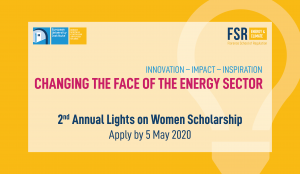NEWS
Nine women shaking up the sustainability, energy and climate sectors

Five years after 193 member countries of the United Nations came together to commit to Sustainable Development Goal 5 on gender equality, large gender gaps persist across the world, especially in the workforce. Multiple studies by McKinsey showed that Companies in the top quartile of diversity, with more women in positions of power on their executive teams, were 36 % more likely to outperform on productivity and profitability; compared to companies in the bottom quartile for both gender and ethnic diversity, which were 27 % more likely to underperform.
The energy, sustainability and climate sectors are no exception, in fact, they remain the least diverse with marginal progress made. According to a study from the European Parliament, the barriers faced by women in employment in technical fields are linked to structural, cultural and even personal factors. The labour market is just the tip of the iceberg. Gender gaps exist at every level starting with gender socialization to education and training, leading to widespread under-representation of women in key sectors. It also means that the enormous potential of female professionals in technical functions remains severely untapped – at a great cost for our societies.
On the bright side, new sectoral trends like the emergence of renewable energy and a collective, unprecedented level of interest towards climate issues and creating a path towards just and inclusive policies may offer new chances to women to join in the race in growing numbers towards an all-encompassing energy transition.
With the launch of the 2nd Lights on Women Scholarship, we celebrate the experts and pioneers who innovate, inspire, and have made long-lasting, impactful contributions in energy, sustainability and climate.
Check out our list!
Katharine Viner
Part of changing the world is changing the conversation happening in it. Katharine Viner has been doing just that in her long, prestigious journalistic career.
Viner has been the editor-in-chief of British newspaper the Guardian, since 2015. In 2019 she launched The Guardian’s initiative to address the most urgent issue of our times: climate emergency. The newspaper has pledged to their readers to intensify efforts to produce environmental reports, change their language in order to reflect the severity of the crisis, stop advertising from fossil fuel extractive companies and strive to achieve themselves net zero emissions by 2030.
With her efforts Viner hopes to make a long-lasting, global impact: “My pledge today is that the Guardian will give the climate crisis the attention it demands – and deliver our open independent reporting to everyone”.
Wandee Khunchornyakong
Wandee Khunchornyakong, dubbed Thailand’s solar power pioneer, has a 30-year long career in the energy sector and a long list of achievements to match. Khunchornyakong still runs SPCG, Thailand’s largest solar power firm, which she founded in 1993. The firm supplies 260 megawatts annually to an area covering 2,000 acres in the northeast of the country. When she first started being interested in solar energy, the business was in its primordial stage but she had a hunch: “I was interested in solar power because it is a global trend. I know green technology will be the future of renewable energy for Thailand,” she said.
She spent months researching and discovered that Thailand was just the right place to start: the country has strong solar-radiation levels throughout the year as opposed to other countries in the region and even developed countries. The rest, in Thailand, is history.
Ailun Yang
Ailun Yang is an expert on China’s climate policies and emissions and currently works with the environment team at Bloomberg Philanthropies, New York.
Yang has been a senior associate at the World Resources Institute leading a project on low-carbon development in major developing countries like China and India. Her resume includes a high profile climate and energy campaign at Greenpeace China, working closely with Chinese renewable energy industries. In her current position, she focuses on the global coal market and continues to explore China’s power sector. Yang has openly and actively criticized the Chinese government on this issue in the media.
Kadri Simson
Kadri Simson has been serving as a European Commissioner for Energy in the Von der Leyen Commission since 1 December 2019. She is the second female Commissioner for Energy appointed after Loyola de Palacio. With Von der Leyen’s Commission unveiling the new European Green Deal, Simson’s has taken on a rather ambitious challenge. Nevertheless, the plan to achieve climate-neutral by 2050 seems to rest in good hands.
For Simson, making progress in the sectors of energy and climate is inherently connected to achieving gender balance. In a statement for the Lights on Women initiative, she stated, “I strongly believe that the promotion of gender equality in the energy sector has tremendous potential, especially in the context of the clean energy transition, which according to recent estimates can create 60 million new jobs globally in the next 20 years. The European Green Deal is our climate and growth strategy, but it can also help us in our quest towards gender equality”.
Simson is Estonian and previously served in her country as Minister of Economic Affairs and Infrastructure in 2016 to 2019
Damilola Ogunbiyi
Damilola Ogunbiy is the CEO and Special Representative of the UN Secretary-General for Sustainable Energy for All and Co-Chair of UN-Energy. Sustainable Energy for All (SEforALL) is an initiative designed to further progress on Sustainable Development Goal 7 (universal energy access) and the Paris Agreement. Before joining SEforALL, Ogunbiyi was the first female Managing Director of the Nigerian Rural Electrification Agency. In her role, she was responsible for an electrification project that led to the rapid development of solar mini-grids and to the deployment of solar home systems across Nigeria.
In her professional career, the Nigerian-born has worked both for private firms and the government mainly on closing energy access gaps.
Ngozi Okonjo-Iweala
Ngozi Okonjo-Iweala currently serves as Co-Chair of the Global Commission on the Economy and Climate. Previously, she served two mandates as Nigeria’s Finance Minister (2003-2006 and 2011-2015), and as Foreign Minister in 2006, the first woman in her country to hold both positions. During her tenure, the country’s economy, the largest in Africa, has grown an average of 6% (per annum) over three years.
Okonjo-Iweala is a forward-looking thinker, recognised globally for her work and featured in TIME 2014’s Top 100 Most Influential People in the World.
She believes that now is the time to put climate change on the African Union’s agenda and that African countries can lead on climate action whilst achieving both development and climate targets.
Sunita Narain
You might have seen her Leonardo di Caprio’s documentary Before the Flood, but Sunita Narain is a star in her own right. Narain is an Indian writer, political activist and environmentalist who served in the country’s green movement. She currently holds the position of Director General at the Centre for Science and Environment and of treasurer at the Society for Environmental Communications.
Narain is known to be an outspoken advocate for social change and to be the voice of the poor and disadvantaged. In Before the Flood, she makes a point that the global fight against climate change cannot be won without keeping in mind sustainable development goals across the planet: “We (Indian people) care about climate change. But the fact is we are a country where energy access is as much a challenge as climate change. We need to make sure every Indian has access to energy”.
In 2016, Narain made it into Time Magazine’s list of 100 Most Influential People.
Savera Weerasinghe
Savera Weerasinghe is a 28-year-old businesswoman who’s sustainable business practices have saved 11,000 pounds of plastic from Sri Lanka’s oceans.
At 24, Savera began running a packaging factory as part of her family’s business. Shocked by the amount of single-use plastic that was used and sold as part of their operations, she started searching for accessible green solutions for their industrial clients. She knew that her company, Ananta, had to offer green packing alternatives that were inexpensive, compostable (due to the lack of recycling infrastructure) and targeted at sectors with conscious consumers.
In line with many emerging millennial-run, sustainability-focused businesses, Savera moved away from traditional marketing, putting her energy, and budget, into community outreach. From organizing community clean-ups to hosting local events and awareness workshops, her mission is to inspire citizen-driven, collective action to our world’s waste crisis. “The goal is to act as a node or a hub so that we can connect people,” said Weerasinghe in a Forbes interview.
Denise Gray
Denise Gray is making waves in a traditionally alpha male-dominated sector: electrical engineering. The Detroit-born Gray is the president of LG Chem Michigan Inc., a company manufacturing lithium-ion battery systems that contribute to powering up electric and driverless vehicles in the US and beyond.
At LG Chem Michigan Inc. She is responsible for all the technical aspects involving vehicle electrification and energy storage: strategic direction, engineering, and business development.
The Lights on Women Scholarship
 The Florence School is offering four scholarships to women pioneering innovative energy solutions, research and initiatives that accelerate the energy transition.
The Florence School is offering four scholarships to women pioneering innovative energy solutions, research and initiatives that accelerate the energy transition.
The annual Lights on Women scholarship aims to support motivated early- or mid-career women in their professional advancement with new or strengthened capabilities by providing free access to one of the FSR online courses (of their choice) starting in Autumn 2020.
